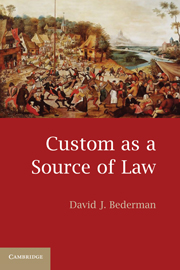11 - Public International Law
Custom Among Nations
Published online by Cambridge University Press: 05 June 2012
Summary
Customary international law presents the greatest concentration of theoretical and doctrinal problems reviewed in this book. This is, in and of itself, a bit of a puzzle. Why has the role of custom in public international law been so hotly disputed for so long? Why, especially in comparison with discussions about the place of custom in domestic legal doctrines (see Chapters 5–9), has customary international law (CIL) been overemphasized and overtheorized? Why are the doctrinal features and contours of CIL so distinct, even in relation to other, purely public law subjects (such as constitutional law, discussed in Chapter 9)? And, why, after nearly half a millennia of debate, are we no closer to conclusive answers as to what makes a binding custom among nations, the relation between CIL and other international law sources of obligation (particularly treaties), and the process by which customary international law changes or dies?
There are, perhaps, a number of reasons for what may be called exceptionalism for CIL. The first of these is that, alone among legal fields, public international law acknowledges custom as being a leading source of obligation. There is currently enshrined a definitive statement of the sources of international law. It can be found in Article 38 of the Statute of the International Court of Justice (ICJ), or World Court, which indicates that, in disputes submitted to it, the Court shall apply:
international conventions, whether general or particular, establishing rules expressly recognized by contesting states;
international custom, as evidence of a general practice accepted as law;
the general principles of law recognized by civilized nations;
… judicial decisions and the teachings of the most highly qualified publicists of the various nations, as a subsidiary means for the determination of rules of law.
- Type
- Chapter
- Information
- Custom as a Source of Law , pp. 135 - 167Publisher: Cambridge University PressPrint publication year: 2010
- 1
- Cited by



